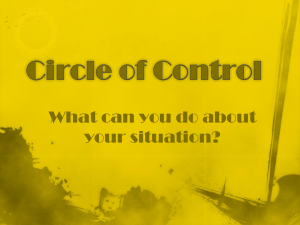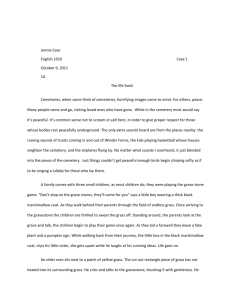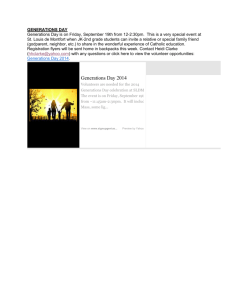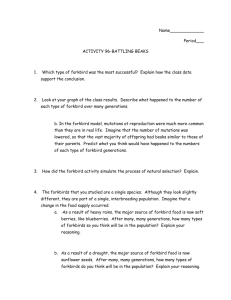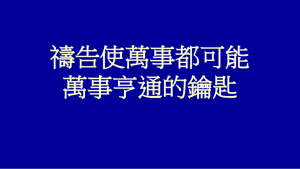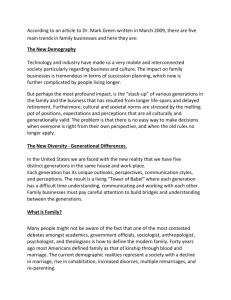Back to the Future - The Santa Monica Synagogue
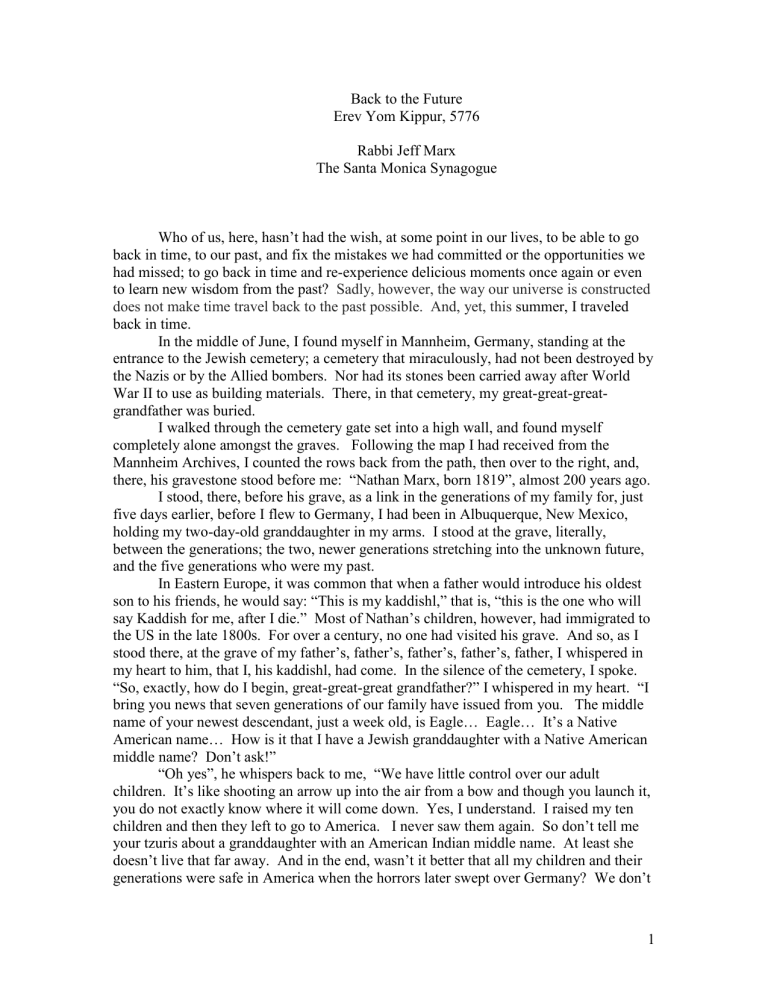
Back to the Future
Erev Yom Kippur, 5776
Rabbi Jeff Marx
The Santa Monica Synagogue
Who of us, here, hasn’t had the wish, at some point in our lives, to be able to go back in time, to our past, and fix the mistakes we had committed or the opportunities we had missed; to go back in time and re-experience delicious moments once again or even to learn new wisdom from the past? Sadly, however, the way our universe is constructed does not make time travel back to the past possible. And, yet, this summer, I traveled back in time.
In the middle of June, I found myself in Mannheim, Germany, standing at the entrance to the Jewish cemetery; a cemetery that miraculously, had not been destroyed by the Nazis or by the Allied bombers. Nor had its stones been carried away after World
War II to use as building materials. There, in that cemetery, my great-great-greatgrandfather was buried.
I walked through the cemetery gate set into a high wall, and found myself completely alone amongst the graves. Following the map I had received from the
Mannheim Archives, I counted the rows back from the path, then over to the right, and, there, his gravestone stood before me: “Nathan Marx, born 1819”, almost 200 years ago.
I stood, there, before his grave, as a link in the generations of my family for, just five days earlier, before I flew to Germany, I had been in Albuquerque, New Mexico, holding my two-day-old granddaughter in my arms. I stood at the grave, literally, between the generations; the two, newer generations stretching into the unknown future, and the five generations who were my past.
In Eastern Europe, it was common that when a father would introduce his oldest son to his friends, he would say: “This is my kaddishl,” that is, “this is the one who will say Kaddish for me, after I die.” Most of Nathan’s children, however, had immigrated to the US in the late 1800s. For over a century, no one had visited his grave. And so, as I stood there, at the grave of my father’s, father’s, father’s, father’s, father, I whispered in my heart to him, that I, his kaddishl, had come. In the silence of the cemetery, I spoke.
“So, exactly, how do I begin, great-great-great grandfather?” I whispered in my heart. “I bring you news that seven generations of our family have issued from you. The middle name of your newest descendant, just a week old, is Eagle… Eagle… It’s a Native
American name… How is it that I have a Jewish granddaughter with a Native American middle name? Don’t ask!”
“Oh yes”, he whispers back to me, “We have little control over our adult children. It’s like shooting an arrow up into the air from a bow and though you launch it, you do not exactly know where it will come down. Yes, I understand. I raised my ten children and then they left to go to America. I never saw them again. So don’t tell me your tzuris about a granddaughter with an American Indian middle name. At least she doesn’t live that far away. And in the end, wasn’t it better that all my children and their generations were safe in America when the horrors later swept over Germany? We don’t
1
know how the future will unfold. So on the High Holy Days, when you’re talking to your congregation, remind them not to spend a lot of time worrying about the future. The future is unknowable. It will happen as it happens.”
“You’re right”, I say. “We do spend a lot of time worrying about how things will come out. We worry in our 20s about making the right choice for our careers. When we land a job we worry about the politics at work, we worry about switching jobs, and then, in our later years, we worry about losing jobs. We worry about retirement. We start, when we’re young by worrying about whether we’re likeable, desirable. Then, we worry about the relationship we’re in. We have children, and don’t stop worrying about them,
And then we start to worry about our eyesight, hearing and memory. But the future is unknowable. We really don’t have any control over that. The only thing that’s real, I guess, is the present moment, experiencing life fully, going with the flow, stopping to smell the flowers.”
“What are you, a Hippie?” he asks me. “What are you talking about? There is no present! Let me tell you something else to share with your congregation: By the time we experience the present and analyze it, it’s already done; it’s the past. The starlight you see up in the sky at night? That light has been traveling for millions of years. It’s old news. The words you are hearing have already been uttered, the scenes you are seeing have already taken place, the feelings you have, though they have arisen within seconds from a stimulus, still, are reactions to events that have already occurred.”
“No”, my great-great-great-grandfather says, “there is no present. Forget all that
Buddhist stuff. I tell you, the only thing that is real in life, is the past. The past can’t be changed because it has already happened and it’s now the permanent record of the universe. That’s what’s real. Everything that you do in life becomes your past, becomes your legacy. That’s why, on the High Holy Days, we talk about the Book of Life. Let me tell you, the Book of Life is the record of our lives. In it, is recorded what we have done. That’s the only thing that is certain.”
“Yes”, I say. “That makes sense. That really is what the High Holy Days are about, to look back at our past year and to evaluate what we have done. What were the changes in our lives? What were the changes that should have occurred but didn’t? Was there growth, simply marking time, or stagnation? The High Holy Days are a time to look back at the trajectory of our lives, our work, our relationships, to look the quality of our lives, and to answer the question: ‘what kind of person were we?’
And, then”, I said, warming to my topic, “There’s this terrific Rabbinic teaching that when we die and stand before God for judgment that each and everyone of our days comes forward to present testimony as to how we lived those days. Who we are, then, is, in the end, the sum not only of our days but our hours and our moments. Our past gives testimony to who we are.”
“Listen”, he breaks in, “Spare me the sermon. Tell me, if our past gives testimony to who we are and who we were, what do they say about me?” “Well”, I replied, “To be honest, there’s not much that has survived about you but written here, on your gravestone, it says: ‘Unser Unvergesslicher Gatte und Vater… Our Unforgettable
Husband and Father.’ So I guess that even in the midst of your busy and successful business life, you were a good family man. It’s interesting that your gravestone doesn’t list your business accomplishments, only your family relationships.”
2
“Yes”, he says. “Look around you at the other stones. There’s not one here that lists the wealth, the position, the business skill of the deceased. The only things mentioned are their relationships and the quality of those relationships. So when you talk to your congregation in the Fall, ask them to think about the quality of their relationships with their spouses, children, parents, friends, and co-workers this last year. Ask them to consider what people will say about what we have done. We don’t really create our future as much as we make our past, and, speaking of making our past, tell me, what else do they say about me?”
“Well,” I answer, “It also is written on your gravestone: ‘Natan ben Mordechai’,
Nathan the son of Mordechai. You lived your life as a link in the chain of tradition. If the only real thing is the past, then we need to keep the past alive. We need to honor our ancestors, we need to reflect on those who came before us who gave us life and shaped us. We need to tell their stories. I guess its no coincidence that on Yom Kippur, when we reflect on the past, that we have our Yizkor service.”
“Yes”, he answers, “but don’t get too carried away by the past. We create it, we can learn from it, but we don’t have to be chained to it. New patterns can take place.
Our new past can be different than our old past. Look at me: I made the decision to leave the village where our family had lived for a hundred years. I’m sure it was a huge move for my children to set sail for America and, now, your daughter decided to marry the guy she did and go to live in New Mexico. Each generation of our family has made the choice to stay or to go. We can do things differently than others have done. We can do things differently than we have done.”
“I might get a sermon out of this”, I exclaimed. “This is exactly what the High
Holy Days are about: making changes in our lives. Yes, some changes are harder than others. It’s not easy to change jobs, careers, and places of residence. It’s hard to give up our cravings for many pleasures. It’s hard to reign in our passions and vices, to deny the siren call of the body. It’s hard to mend broken relationships. It’s hard to apologize, it’s hard to set out in new directions. But we can do it, we can create a new past for ourselves. We have the freedom, the ability, the gift, of being able to write new stories in the Book of Life this coming year.”
The afternoon was growing late and so I got ready to take my leave. I, the kaddishl of Nathan Marx, recited out loud the Kaddish prayer. “I have not forgotten you”, I whispered. “Thank you for coming”, my great-great-great grandfather said,
“Thank you for remembering.” I placed a stone on his grave, and bade him farewell.
On this evening of Yom Kippur, then, I share with you what I learned when I went time traveling, there, in the silence of the cemetery: that what is real, is not the future that has not yet happened. What is real is not even the present moment that we can only fleetingly occupy, but that actually, what is real is the past, a past that we can continuously shape and create anew, at every moment. In the New Year to come, may the words we utter, may the deeds we perform that will be written down in our Book of
Life, our story, may they be words and deeds of generosity and love, of care and concern, of compassion and of peace. May the story we write, be one that the generations who follow us will read and will declare to be good. And may we be blessed, long, long after we are gone, that one day, a kaddishl from the generations that follow us, will come to visit us, to remember us, and to bless us.
3
